By Kemi Osukoya
THE AFRICA BAZAAR MAGAZINE
March 2015
(Part 2 of featured story: “Changing Africa’s Political Narratives, One Story at a Time“)
They know their people. They have keen insights to what people wants and needs and are willing to put those needs ahead of their own monetary and political needs. They have acquired a taste for harmonious society that goes beyond tolerance, but is underpinned by a moral conviction and humanist value. They aren’t concerned with the privileges and glamours that their leadership position brings. For them, the job is more of privileged servitude to the public.
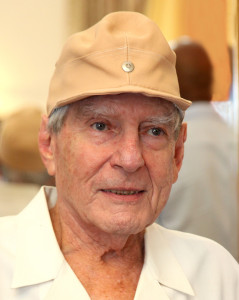 It’s hard enough for anyone in a leadership position to please everyone, and even harder if you are a political leader in Africa. But that didn’t detour former Seychelles’s President France Albert Rene [known as the father of modern seychelles] from changing the country’s political and socioeconomic trajectory by setting and pursuing what was for that era considered to be audacious goals for the country- to bring about social equality and economic development to the people.
It’s hard enough for anyone in a leadership position to please everyone, and even harder if you are a political leader in Africa. But that didn’t detour former Seychelles’s President France Albert Rene [known as the father of modern seychelles] from changing the country’s political and socioeconomic trajectory by setting and pursuing what was for that era considered to be audacious goals for the country- to bring about social equality and economic development to the people.
He transformed what was once an impoverished and chaotic nation dogged by racism, social-economic inequality and high illiteracy, into one of African most stable democracies and socio-economic advanced countries on the continent in the 21st century, one that the Duke and Duchess of Cambridge fancied enough to choose as their honeymoon destination in 2011.
For President Rene, whose path to the presidential office in 1977 wasn’t through the traditional democratic route, (he nevertheless once in office, went on to lead the country to its democratic path,) it was more crucial for his administration to invest in health services, education, human capital, and to develop the socio-economic conditions of the society by offering free, mandatory universal traditional and alternative education programs, regardless of family income, thereby creating a skilled human capital and a competitive market; developed the nation’s agriculture sector and fishing industry to provide food security and enforced a legal minimum wage to raise incomes so people feel empowered, than to be admired by everyone.
Through social program systems focused on lifting people out of poverty and empowering them to be self sufficient rather than depend on government or charity aid dependence, the nation’s population socio-economic standards not only improved, the working class were able to have the ability to play an active part in the affairs of the nation.
Though he has both admirers and critics for the methods he used to attain those goals, The imprints from his efficacy leadership can still be seen and felt in Seychelles society today the results speak volumes of how efficacy leadership can bring about positive change to a nation.
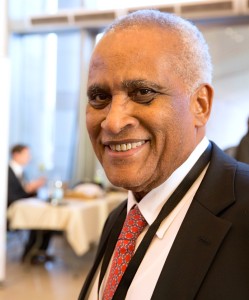 And speaking of having plenty admirers, when we think of African national leaders and presidents that are globally admired, the name of the late South Africa’s President Nelson Mandela’s is among the very few names on a list that will come to mind. However, there are other unsung national heroes like Dr. Salim Ahmed Salim, whose name indisputable belong on that list. Dr. Salim, who [can also be described as African golden child, if there’s such a title given on the continent] currently serves as AfDB’s Ambassador of African Water and chair of Mo Ibrahim foundation’s prize committee, has been carrying a diplomatic torch on behalf of the continent since early 1960s in various domestic and international diplomatic positions, starting at the tender age of 22 when he used his editorialship at a newspaper to galvanized efforts for Zanzibar’s liberation and independence from colonialism thereby changing the political landscape on the continent to later on used his positions at the U.N. to campaign for international sanctions against the then apartheid-South Africa, which led to the suspension of the country from the U.N. and ultimately led to the disaparthiation of the country, a major historic and political moment. Even today, he continue to help change the political landscape on the continent and nurture emerging African political leaders.
And speaking of having plenty admirers, when we think of African national leaders and presidents that are globally admired, the name of the late South Africa’s President Nelson Mandela’s is among the very few names on a list that will come to mind. However, there are other unsung national heroes like Dr. Salim Ahmed Salim, whose name indisputable belong on that list. Dr. Salim, who [can also be described as African golden child, if there’s such a title given on the continent] currently serves as AfDB’s Ambassador of African Water and chair of Mo Ibrahim foundation’s prize committee, has been carrying a diplomatic torch on behalf of the continent since early 1960s in various domestic and international diplomatic positions, starting at the tender age of 22 when he used his editorialship at a newspaper to galvanized efforts for Zanzibar’s liberation and independence from colonialism thereby changing the political landscape on the continent to later on used his positions at the U.N. to campaign for international sanctions against the then apartheid-South Africa, which led to the suspension of the country from the U.N. and ultimately led to the disaparthiation of the country, a major historic and political moment. Even today, he continue to help change the political landscape on the continent and nurture emerging African political leaders.
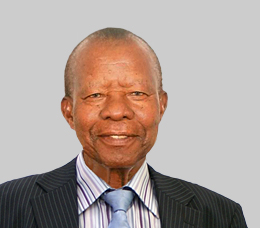 Very few leaders on the continent have the foresight to see beyond the immediate of instituting a democratic nation, but former Botswana’s President Quett Ketumile Joni Masire who left office in 1998 after serving the people of Botswana for 18 years, understood that democracy goes hand in hand with economic growth and social development. He knew that in order for democracy to have a chance at survival in Botswana, it was equivocally important to cultivate and lay the necessary economic foundation that would not just bring about immediate economic growth and transformation to improve the population’s health and socioeconomic conditions, it has to have the potential to secure the nation’s long-term political, economic and socioeconomic future. Under his leadership, Botswana went from a relatively unknown African country dogged by famine to become one of the powerhouses in the Southern African region. President Masire’ played a crucial role in laying the foundation for the nation’s today steady economic growth and development, thanks in part to a social service programs that improved not just the welfare and health of the nation but provided education to the people he served.
Very few leaders on the continent have the foresight to see beyond the immediate of instituting a democratic nation, but former Botswana’s President Quett Ketumile Joni Masire who left office in 1998 after serving the people of Botswana for 18 years, understood that democracy goes hand in hand with economic growth and social development. He knew that in order for democracy to have a chance at survival in Botswana, it was equivocally important to cultivate and lay the necessary economic foundation that would not just bring about immediate economic growth and transformation to improve the population’s health and socioeconomic conditions, it has to have the potential to secure the nation’s long-term political, economic and socioeconomic future. Under his leadership, Botswana went from a relatively unknown African country dogged by famine to become one of the powerhouses in the Southern African region. President Masire’ played a crucial role in laying the foundation for the nation’s today steady economic growth and development, thanks in part to a social service programs that improved not just the welfare and health of the nation but provided education to the people he served.
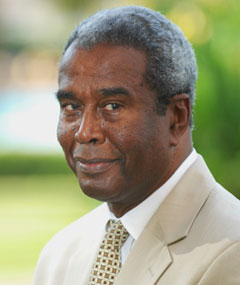 For former Cape Verde’s President Antonio Mascarenhas Monteiro, a strong advocate for democracy in his country and across the continent, he believes human rights and women equality are very much important issues to tackle through economic and social progress and development as well as instituting institutional mechanisms for good governance, transparency and social justice across the continent. During his two-term presidency, he created a market-oriented economic policy program that led to the privatization of many of the state-owned companies and opened the doors to foreign investments and investors, boosting the country’s economic growth. Cape Verdians, despite limited natural resources, enjoy one of the highest living standards in the region and on the continent, thanks to investments made during his presidency into improving national health services and social development.
For former Cape Verde’s President Antonio Mascarenhas Monteiro, a strong advocate for democracy in his country and across the continent, he believes human rights and women equality are very much important issues to tackle through economic and social progress and development as well as instituting institutional mechanisms for good governance, transparency and social justice across the continent. During his two-term presidency, he created a market-oriented economic policy program that led to the privatization of many of the state-owned companies and opened the doors to foreign investments and investors, boosting the country’s economic growth. Cape Verdians, despite limited natural resources, enjoy one of the highest living standards in the region and on the continent, thanks to investments made during his presidency into improving national health services and social development.
As Africans and international leaders together contemplate ways to find solutions to the recent terrorism insurgencies across Africa, it’s worth noting at this points strides and achievements that some Africans leaders have made at combatting extreme terrorism. 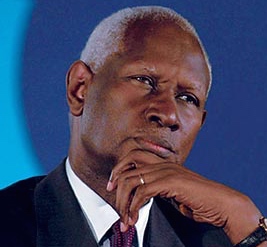 A few African countries like Senegal, which has a majority Muslim population has remained relatively peaceful so far since its independence from France, with its muslims and christians population coexisting harmoniously, thanks in part to laws put in place under the leadership of former President Abdou Diouf, who not only championed and guided Senegal through the birth of democracy to a mature, fully-fledged democratic nation, but continued to play a pivotal role in ensuring peaceful relationships and coexistence between his country and other Islamic countries on the continent. President Diouf’s legacy includes political and socio-economic development for the people and economic growth for his country. Senegal achieved a mini-technology boom under his presidency.
A few African countries like Senegal, which has a majority Muslim population has remained relatively peaceful so far since its independence from France, with its muslims and christians population coexisting harmoniously, thanks in part to laws put in place under the leadership of former President Abdou Diouf, who not only championed and guided Senegal through the birth of democracy to a mature, fully-fledged democratic nation, but continued to play a pivotal role in ensuring peaceful relationships and coexistence between his country and other Islamic countries on the continent. President Diouf’s legacy includes political and socio-economic development for the people and economic growth for his country. Senegal achieved a mini-technology boom under his presidency.
Copyright © 2015 ImeK Media, LLC. All rights reserved.



